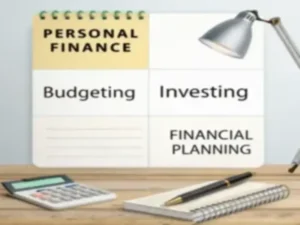Do you want to know the five steps to financial success to improve your financial health? We will review all five pillar financial aspects, from budgeting to investing.
Getting sound financial footing is a big relief. Knowing the right financial track will ensure that your money habits match your financial goals. Financial success and stability help you live comfortably and prepare for unexpected challenges. In the fast-paced world, building a solid financial foundation is crucial. Consider the long run ahead; you’ve every reason to start your financial journey today.
This article will cover the five steps to financial success: setting goals, debt management, budgeting, and more.
Read more: Top 10 Most Asked Personal Finance Questions and Answered
Key Points
- Financial success is a journey that requires short-term and long-term vision and goals. A steady plan is essential for your success and security, building a solid future foundation.
- Businesses invest in growth, and similar individuals should invest in financial education and rapid skill development to boost their career prospects and long-term success.
- Managing your debt is vital for financial success. You should avoid consumer debt, pay off education loans before big purchases like a home, and recognize the difference between productive debt and wasteful consumer debt.
- A shared financial viewpoint and joint planning in marriage can promote smart financial stability.
- Patience is crucial in financial planning. Your investment will benefit from the compounding effect and grow steadily over time.
Read more: 8 Financial Tips for Young Adults Must Know to Success
The Five Steps to Achieve Your Financial Success & Build Wealth
Here are the five steps of financial success. Let’s start.
Create a Budget & Setting Realistic Goals
A well-organized budget is the foundation of your financial stability. It ensures you have a plan for every dollar you earn. It allows you to control your spending limit and allocate funds for saving and investing. A realistic budget helps you stay disciplined and make better financial decisions over time.
Why is budgeting essential?
A realistic budget is your guide to reaching financial goals. Without a budget, you can overspend on expenses. It keeps finances under control, tracks expenses, and saves major unexpected expenses.
Budgeting methods
50/30/20 and zero-based rules are the most popular budgeting methods that help you allocate percentage income to saving and spending.
Common budgeting mistake
We often make mistakes, such as underestimating our expenses. Avoiding these mistakes can make a big difference in our financial health.
Tips on how to create actual budget:
- Track your expenditures using apps or manually record daily expenses to trace where money is spent.
- Categorize spending like groceries, house rent, transport costs, entertainment, travel, and more.
- Use the 50/30/20 plan to allocate 50% of income to essentials, 30% to entertainment and fun, and 20% to saving and paying off debt.
- Regularly review your budget to adjust changes in income or expenditures.
- Set up automated savings accounts and bill payments to avoid penalties.
- Trace progress and adjustment if needed to avoid unnecessary spending.
Read more: Top 10 Must-Read Banking Blogs in the USA
Build an Emergency Fund
Life is always full of unpredictability, but financial security and space ensure that unexpected expenses do not derail your finances. An emergency fund should cover at least 3 to 6 months of your living expenses if unexpected expenses arise.
Unexpected expenditures like car repairs, medical bills, or job loss can happen anytime. An emergency fund prevents you from going into debt when worse situations arise.
How much should we save for the emergency fund?
The emergency fund size can vary depending on each lifestyle, monthly income, and expenses. Financial experts and the rule of thumb recommended putting at least 3 to 6 months’ expenses. You can consider based on family needs, bill obligations, job stability, and more.
How to build an emergency fund?
- Aim to start with a small amount, initially $500 to $1,000, for 3-6 months’ expenses.
- Set up a separate, high-interest-bearing savings account for your emergency fund to avoid non-emergency expenses.
- Set an automated saving schedule that regularly automatically transfers to your emergency fund.
- Review costs and cut back on unnecessary expenses.
- Use bonuses, tax refunds, and unexpected income direct into an emergency fund.
Read more: Top 10 Most Popular Finance Websites in the World
Pay off high-interest debt.
Paying off high interest-bearing debt first is vital for achieving your financial goals and freedom. High interest rate debt can prevent building wealth and economic progress. Paying debt reduces financial burden and improves credit score and financial health. Quickly pay off high-interest debt that can help you focus on investing and saving for the future.
Good vs. Bad Debt
Good debt, such as student loans, mortgages, and business loans, can help you increase your wealth. Bad debt, like high-interest credit cards and predatory loans, increases a heavy burden, so they should be minimized first.
How to avoid debt traps
Begin by paying off the high-interest and expensive loans first. Once you recognize the costly debt, you need to make a strategy to pay it off to prevent yourself from falling into a debt trap. To help you escape from the debt trap, you should focus on accurate budgeting, prioritize debt, and avoid accruing more interest-bearing debt through financial management.
Tips on how to pay off Debt
- Use the snowball method that focuses on high-interest debt and pays off faster to save money on interest.
- Consider consolidating debt, combining high-interest multiple debts into a lower interest to reduce extra payments.
- Negotiate lower interest rates which saves your money in the long run
- Stick to debit card purchases to avoid adding debt load.
- Allocate a specific portion of income to debt repayment every month, and it will not be a negotiable part of the budget.
- Set up automatic payments that help to avoid missed late fees and deadlines.
Read more: The Best 5 Investment Blogs You Should Be Reading
Invest for the future.
Investing is key to building a long-term portfolio and ensuring financial security in retirement. Saving money alone is not enough to maintain a secure financial future. You must take advantage of compound interest to gain both from your original investment and accumulate interest. Successful long-run investing is not as easy as just investing in the stock market—here are proven tips to help you manage your investments for your future.
Why investing is key for future financial success
Effective investing that puts your money will potentially build your wealth. Smart investing allows your money to surpass inflation and add value. The potential investing helps you compound as well as risk-free return. The earlier investing, your money grows through compound interest and leads to wealth over time, leading to aggressive growth in your investment.
Tips on how to start investing
- Contribute to your retirement account, such as an IRA or 401 (k), to maximize tax advantages. Most employers contribute to retirement accounts, which are match-free, solid money.
- If you are new to investing, low-cost index funds offer diversified exposure to the stock market with lower risk than individual investments.
- You can set up automatic investment-like savings that ensure you are consistently contributing to your portfolio.
- Understand risk toleration to choose investments that match financial goals and time horizons.
- Investment portfolio (don’t keep all eggs in a basket) that spreads your investment to different fields to minimize risk.
Continue educating yourself
Financial learning is an ongoing process that makes you a smarter decision-maker and helps you adapt to changing financial outlooks. The financial industry consistently develops and emerges with new investment opportunities, personal finance strategies, and tax laws. Financial education frequently educates you about finance and will help you stay informed, make excellent financial decisions, and adapt to changing lifestyles. Financial sharp knowledge prevents you from costly mistakes and optimizes financial goals.
Top tips on how to continue educating yourself
- I regularly read financial blogs and books, follow finance experts’ advice, and read their books, like The Simple Path to Wealth, Your Money or Your Life.
- Learn from online courses like Udemy, which offer investing and personal finance courses that increase your knowledge. Attend free workshops on investing, budgeting, and retirement planning.
- Follow finance news and stay updated on financial trends, tax laws, and stock market performance by reading from The Wall Street Journal, CNBC, etc.
- Participate in finance communities and forums online, such as Reddit finance threads, to learn from other experts’ opinions and ask questions.
Read more: 6 top insurance companies in New York City
The five steps to financial success (Conclusion)
Financial success requires planning, patience, and strategic action. Setting clear goals, investing wisely, reduce spending and managing debt can build a prosperous and stable financial future.
We hope you understand the five steps to financial success. These steps provide a solid foundation to help you achieve financial goals, improve your financial literacy, and secure your financial future. Financial planning will give you the greatest chance to achieve a successful outcome through proper analysis and expertise.
If you take the above steps, you will find financial success in the year and will shine financially! Just think how satisfied you will be and see how far you have come a year from now.







